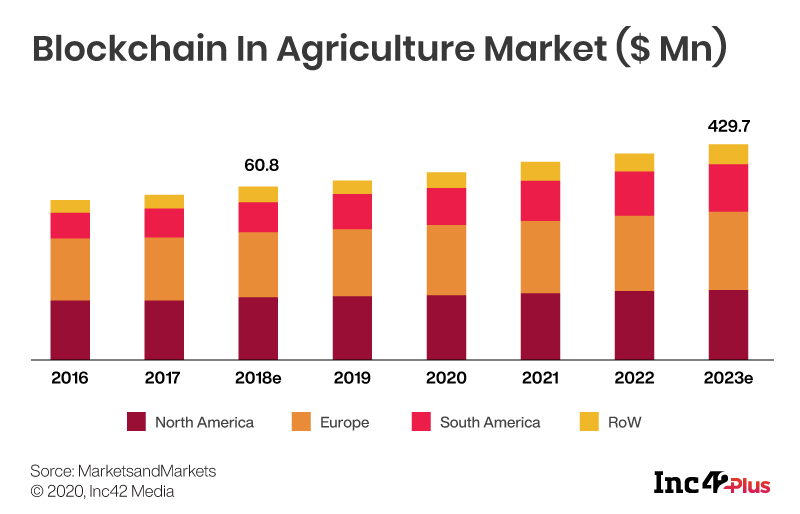Dubai Multi Commodities Centre, CropData Technology launches blockchain-based supply chain platform ‘Agriota E-Marketplace’ to connect Indian rural farmers
The global blockchain in the agriculture and food supply chain market is expected to reach $429.7 Mn by 2023
CoinDCX partners with Blockchain Council by offering blockchain certification courses to professionals
In a bid to connect India’s rural farmers directly to food processing companies, traders and wholesalers in United Arab Emirates (UAE), Dubai Multi-Commodities Centre (DMCC) and Mumbai-based CropData Technology recently launched their blockchain-based supply chain platform ‘Agriota E-Marketplace.’
With this, India’s farmers will now be able to connect directly with food industry stakeholders in the UAE, where they can offer cereal, seeds, vegetables, spices, fruits and condiments. This, in a way, reduces the role of middlemen, thereby making the agri supply chain more efficient.
Today, many blockchain startups are burgeoning in the space. Last year, Pune-based agritech startup Agri 10x had also collaborated with the Indian government to help remote farmers sell their produce directly in the market leveraging blockchain and artificial intelligence (AI) platforms. The blockchain platform will provide local farmers with a fair price, transparency and assist them in collecting real-time data to manage their harvests effectively.
Similarly, focusing on the shrimp supply chain, Gurugram-based QuillHash is also running a traceability pilot, where the platform gives notifications on farmer certifications, count of output shipment, mismatch in balance and more. With this, the authorities have complete visibility of the shrimp supply chain for monitoring the safety standards.
Besides QuillHash, Agri 10x and CropData, globally, there are other players in the market who are redefining the agriculture supply chain, including AgriChain, Covantis, AgriDigital, Ripe, AgriLedger, TE-Food and IBM Food Trust among others.
Blockchain Graph Of The Week:
According to MarketsandMarkets, the global blockchain in the agriculture and food supply chain market is expected to reach $429.7 Mn by 2023, at a compound annual growth rate (CAGR) of 47.8%. The industry, however, is still in the nascent stage, but with the increase in food fraud in many countries, coupled with the growing demand for platforms and solutions to attain traceability of food products across the supply chain has become crucial.

Blockchain News Of The Week:
CoinDCX Partners With Blockchain Council For Certifications
CoinDCX’s education wing DCX Learn recently announced its partnership with Blockchain Council, an online training and blockchain certifications entity. With this, CoinDCX aims to offer specialised training and certification in blockchain technology for professionals intending to start a career in the industry.
Blockchain Council’s executive director Toshendra Sharma, in a press statement, said with this partnership, they will be able to provide maximum benefits from using a real crypto exchange interface which will prepare them sufficiently for their future careers in blockchain space.
Shanghai’s Jing’an District Issues Blockchain-Based Discount Coupons Via WeChat
Jing’an Culture and Tourism Bureau is issuing blockchain-based discount coupons using its WeChat mini-programme, as reported by local news portal Shine. WeChat mini-programmes are smaller sub-applications built within the ecosystem to offer several online services like ecommerce, music and video streaming and translation. Upon the purchase, users will be getting blockchain-based coupons, which they can redeem them at the movies, theater performance and for online courses among others.
NASA Looks To Use Blockchain System For Quadcopter Communications
The US government’s space agency NASA, alongside US-based tech firms Orbit Logic and the Fraunhofer USA Center for Experimental Software Engineering, recently announced that they are developing communications solutions for the space agency’s quadcopter fleet called SCRAMBL (Space Communication Reconstruction and Mapping with Blockchain Ledgering).
As explained in a brief, NASA seeks to use blockchain to propagate data between networking satellites, increasing their communication efficacy, coordination and ‘overall awareness.’
